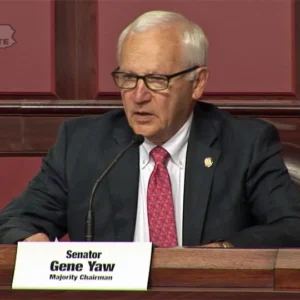Pennsylvania may now be in the Regional Greenhouse Gas Initiative, but Republican politicians are not giving up their opposition to the cap-and-trade system.
“We stand by our position that entering an interstate compact and imposing a carbon tax on Pennsylvanians requires legislative approval–not unilateral action by the governor,” state Sens. Jake Corman (R-Centre/Juniata/Mifflin), Kim Ward (R-Westmoreland), Pat Browne (R-Lehigh), and Gene Yaw (R-Bradford/Lycoming/Sullivan/Susquehanna/Union) told Delaware Valley Journal. “Although we are disappointed in this temporary setback, we will continue to press our argument to the court that the administration cannot legally take further steps to join RGGI.”
The Regional Greenhouse Gas Initiative is a carbon cap-and-trade program among mostly-blue northeastern states: Connecticut, Delaware, Maine, Maryland, Massachusetts, New Hampshire, New Jersey, New York, Rhode Island, Vermont, and Virginia.
The battle began in October 2019 when Gov. Tom Wolf (D) took executive action instructing the Pennsylvania Department of Protection (DEP) to join the RGGI. Wolf said that would reduce greenhouse gas emissions, combat climate change, and generate economic growth.
“Climate change is the most critical environmental threat confronting the world, and power generation is one of the biggest contributors to greenhouse gas emissions,” said Wolf. “Given the urgency of the climate crisis facing Pennsylvania and the entire planet, the commonwealth must continue to take concrete, economically sound, and immediate steps to reduce emissions, (so) joining RGGI will give us that opportunity to better protect the health and safety of our citizens.”
Wolf took to Twitter to celebrate Pennsylvania’s entrance into RGGI.
“It’s official,” said Wolf. “I’m proud Pennsylvania is on the path to becoming a leader in the fight against climate change through the Regional Greenhouse Gas Initiative.”
Penn Future President and CEO Jacquelyn Bonomo applauded the move.
“Finalizing this transformative climate policy is a victory for all of Pennsylvania and future generations,” Bonomo said in an article on NBCPhiladelphia.com. “Pennsylvania is responsible for 4 percent of U.S. greenhouse gas emissions and 1 percent of global emissions. This cap-and-invest program will deeply cut into Pennsylvania’s pollution by limiting what comes from our dirtiest power plants.”
Gordon Tomb, senior fellow for the Harrisburg-based Commonwealth Foundation, said he believes RGGI will do more harm than good.
“Gov. Wolf has acted consistently against the interests of working Pennsylvanians, whether it is his attempt to impose a 30 percent tax on Pennsylvania’s electricity bills, his arbitrary closures of businesses during the pandemic, or his siding with special interests opposing education choice,” Tomb told Delaware Valley Journal. “RGGI will raise taxes on Pennsylvania consumers during runaway inflation and produce no environmental benefit.”
Pittsburgh Works Together, a cooperative venture of business and labor, also sees problems.
“It’s very unfortunate that we have reached this point as DEP’s own analysis shows that there will be virtually no change in carbon emissions in 2030 in the PJM service area as any reductions in Pennsylvania’s carbon emissions are offset by increases in neighboring non-RGGI states,” Jeff Nobers, executive director for Pittsburgh Works Together told Delaware Valley Journal. “This is by executive order, not the will of the people or consent of the legislature, and will lead to increased energy costs further hurting lower-income families, the loss of thousands of good-paying union jobs, and no meaningful reduction in emissions.”
Other groups that are opposed to Pennsylvania’s participation in RGGI include National Federation of Independent Business (NFIB) and the Pennsylvania Manufacturers’ Association (PMA)
In March, Melissa Morgan of NFIB Pennsylvania told a Senate committee higher energy prices are the last thing small business owners need at this time.
“Small businesses have been disproportionately impacted by the effects of COVID-19, and many are still struggling,” Melissa Morgan, assistant state director of NFIB Pennsylvania, told a Senate committee in late March. “Shutdown orders, a lack of workforce, supply chain disruptions, record-high inflation, and a recovering economy have devastated a sizable segment of Pennsylvania’s small businesses.”
Carl A. Marrara, PMA vice president of government affairs, warned that RGGI would cause industries to relocate.
Marrara said it is “not a stretch” to say supporting RGGI is supporting Russian and Middle Eastern global energy leadership and Chinese steel dumping. He called for a market-based approach.
RGGI could be an issue in this year’s gubernatorial election, and not just for Republicans seeking that office. Democratic Attorney General Josh Shapiro has also skeptical of RGGI.
“I refuse to accept the false choice between protecting jobs or protecting our planet — we must do both, and my priority will be ensuring Pennsylvania has a comprehensive climate and energy policy that will move all of us forward,” said Shapiro in an October 2021 statement.
Follow us on social media: Twitter: @DV_Journal or Facebook.com/DelawareValleyJournal

